
Frank Vincent Zappa was an American musician, composer, and bandleader. In a career spanning more than 30 years, Zappa composed rock, pop, jazz, jazz fusion, orchestral and musique concrète works; he also produced almost all of the 60-plus albums that he released with his band the Mothers of Invention and as a solo artist. His work is characterized by nonconformity, improvisation sound experimentation, musical virtuosity and satire of American culture. Zappa also directed feature-length films and music videos, and designed album covers. He is considered one of the most innovative and stylistically diverse musicians of his generation.
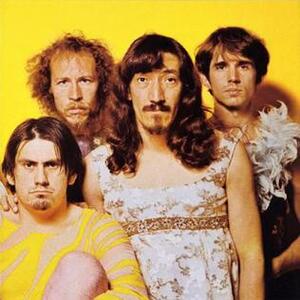
We're Only in It for the Money is the third album by American rock band the Mothers of Invention, released on March 4, 1968, by Verve Records. As with the band's first two efforts, it is a concept album, and satirizes left- and right-wing politics, particularly the hippie subculture, as well as the Beatles' album Sgt. Pepper's Lonely Hearts Club Band. It was conceived as part of a project called No Commercial Potential, which produced three other albums: Lumpy Gravy, Cruising with Ruben & the Jets, and Uncle Meat.

Freak Out! is the debut studio album by the American rock band the Mothers of Invention, released on June 27, 1966, by Verve Records. Often cited as one of rock music's first concept albums, it is a satirical expression of guitarist/bandleader Frank Zappa's perception of American pop culture and the nascent freak scene of Los Angeles. It was the second rock music double album ever released, following Bob Dylan's Blonde on Blonde just one week earlier, as well as the first double debut album by a rock artist. In the UK, the album was originally released as an edited single disc.
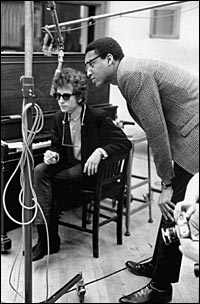
Thomas Blanchard Wilson Jr. was an American record producer. He is best known for his work in the 1960s with acclaimed artists such as Bob Dylan, Frank Zappa and the Mothers of Invention, Simon & Garfunkel, the Velvet Underground, Cecil Taylor, Sun Ra, Eddie Harris, Nico, Eric Burdon and the Animals, the Blues Project, the Clancy Brothers and Tommy Makem, and others.

200 Motels is a 1971 surrealist musical film written and directed by Frank Zappa and Tony Palmer, and featuring music by Zappa. An international co-production of United States and the United Kingdom, the film stars the Mothers of Invention, Theodore Bikel, Keith Moon and Ringo Starr.

Cruising with Ruben & the Jets is the fourth album by the Mothers of Invention, and fifth overall by Frank Zappa, released under the alias Ruben and the Jets. Released on December 2, 1968 on Bizarre and Verve Records with distribution by MGM Records, it is a concept album, influenced by 1950s doo-wop and rock and roll. The album's concept deals with a fictitious Chicano doo-wop band called Ruben & the Jets, represented by the cover illustration by Cal Schenkel, which depicts the Mothers of Invention as anthropomorphic dogs. It was conceived as part of a project called No Commercial Potential, which produced three other albums: Lumpy Gravy, We're Only in It for the Money and Uncle Meat.

Psychedelic folk is a loosely defined form of psychedelia that originated in the 1960s. It retains the largely acoustic instrumentation of folk, but adds musical elements common to psychedelic music.

The Mothers of Invention were an American rock band from California. Formed in 1964, their work is marked by the use of sonic experimentation, innovative album art, and elaborate live shows. Originally an R&B band called the Soul Giants, the band's first lineup comprised Ray Collins, David Coronado, Ray Hunt, Roy Estrada, and Jimmy Carl Black. Frank Zappa was asked to take over as the guitarist when a fight between Collins and Hunt led to the latter's being fired. Zappa insisted they perform his original material — a decision that resulted in Coronado's leaving because he did not agree to the change — and on Mother's Day in 1965 the band changed its name to the Mothers. Record executives demanded the name be changed again, and so, "out of necessity", Zappa later said, "We became the Mothers of Invention".

Aynsley Thomas Dunbar is an English drummer. He has worked with John Mayall, Frank Zappa, Jeff Beck, Journey, Jefferson Starship, Nils Lofgren, Eric Burdon, Shuggie Otis, Ian Hunter, Lou Reed, David Bowie, Mick Ronson, Whitesnake, Pat Travers, Sammy Hagar, Michael Schenker, UFO, Michael Chapman, Jake E. Lee, Leslie West, Kathi McDonald, Keith Emerson, Mike Onesko, Herbie Mann and Flo & Eddie. Dunbar was inducted into the Rock and Roll Hall of Fame as a member of Journey in 2017.

Mothermania (1969), subtitled The Best of the Mothers, is a compilation album by the Mothers of Invention. While the songs were previously released on Freak Out!, Absolutely Free and We're Only in It for the Money, it contains unique mixes or edits made specifically for this compilation.
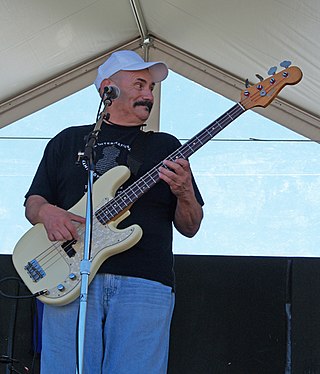
Roy Estrada is an American former musician. He is best known for being the original bassist of both the Mothers of Invention and Little Feat. He was also later a member of Captain Beefheart's the Magic Band and occasionally still worked with Frank Zappa in Zappa's solo career following the Mothers' split.

Volume 3: A Child's Guide to Good and Evil is the fourth album by the American psychedelic rock band The West Coast Pop Art Experimental Band (WCPAEB), and was released on Reprise Records in May 1968. By the time the group commenced recording Volume 3, guitarist Danny Harris had excused himself from the WCPAEB, reducing their numbers to a trio. As with the WCPAEB's earlier work, the album saw the band continue to blend psychedelic influences and complex studio techniques, and was marked by a bizarre fusion of innocence and malice in the band's lyrics. Volume 3 featured the WCPAEB's most ambitious music to date, and the striking cover art of John Van Hamersveld, yet it failed to sell in sufficient copies to chart nationally. In more recent times, the album has been considered the band's most accomplished work and a masterpiece of the psychedelic genre.

200 Motels, the soundtrack album to Frank Zappa's film of the same name, was released by United Artists Records in 1971. The original vinyl release was a two-record set, largely containing alternating tracks of rock music performed by the Mothers of Invention and symphonic music performed by the Royal Philharmonic Orchestra conducted by Elgar Howarth, all composed and orchestrated by Zappa. The album peaked at No. 59 on the Billboard 200, though reviewers deemed it a peripheral part of Zappa's catalog. Like the film, the album involves the theme of a rock band on tour and a loose storyline about The Mothers of Invention going crazy in the small town of Centerville and bassist Jeff quitting the group, as did his real life counterpart, Jeff Simmons, who left the group before the film began shooting and was replaced by actor Martin Lickert for the film.

Pebbles, Volume 3, subtitled The Acid Gallery, is a compilation album featuring American underground psychedelic rock musical artists from the 1960s. It is the third installment of the Pebbles series and was released on BFD Records in 1979. The album is marked for containing among the most unusual recordings of psychedelic music.

"Who Are the Brain Police?" is a Frank Zappa song, performed by The Mothers of Invention, released on the Mothers' debut album, Freak Out!. It was released by Verve Records as a single in 1966. Zappa said the song had a religious theme, according to one source.
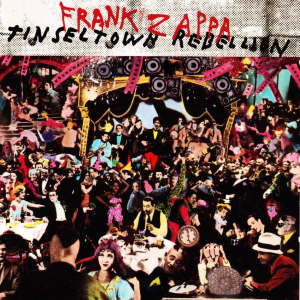
Tinsel Town Rebellion is a double live album released by Frank Zappa in May 1981. The album was conceived by Zappa after he scrapped the planned albums Warts and All and Crush All Boxes, and contains tracks that were intended for those albums.
"The Return of the Son of Monster Magnet" is a Frank Zappa composition, performed by the Mothers of Invention, released on the Mothers' debut album, Freak Out!. It is the longest song on the album, at 12:17, consisting of 2 parts: "Ritual Dance Of The Child-Killer", and "Nullis Pretii ". The composition includes a musical quote from "Louie Louie".
Euclid James "Motorhead" Sherwood was an American rock musician notable for being a member of the original version of Frank Zappa's band the Mothers of Invention, providing soprano, tenor and baritone saxophone, tambourine, vocals and vocal sound effects. He appeared on all the albums of the original Mothers line-up and the 'posthumous' releases Burnt Weeny Sandwich and Weasels Ripped My Flesh, as well as certain subsequent Zappa albums. He also appeared in the films 200 Motels, Video from Hell and Uncle Meat.
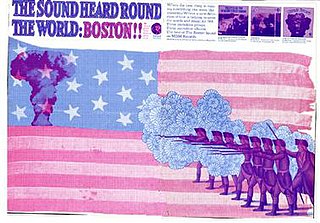
The Bosstown Sound was the catchphrase of a marketing campaign to promote psychedelic rock and psychedelic pop bands in Boston, Massachusetts, in the late 1960s. The concept was conceived by the record producer Alan Lorber as a marketing strategy intended to establish several underground musical artists native to the city on the national charts and compete with the popular San Francisco Sound. Lorber chose Boston for his plan because of the several bands developing in the city, the abundance of music venues, and the proximity of MGM Records, which had signed the core groups.
Autosalvage was an American psychedelic rock band from New York City, who recorded and released one album in 1968.

















